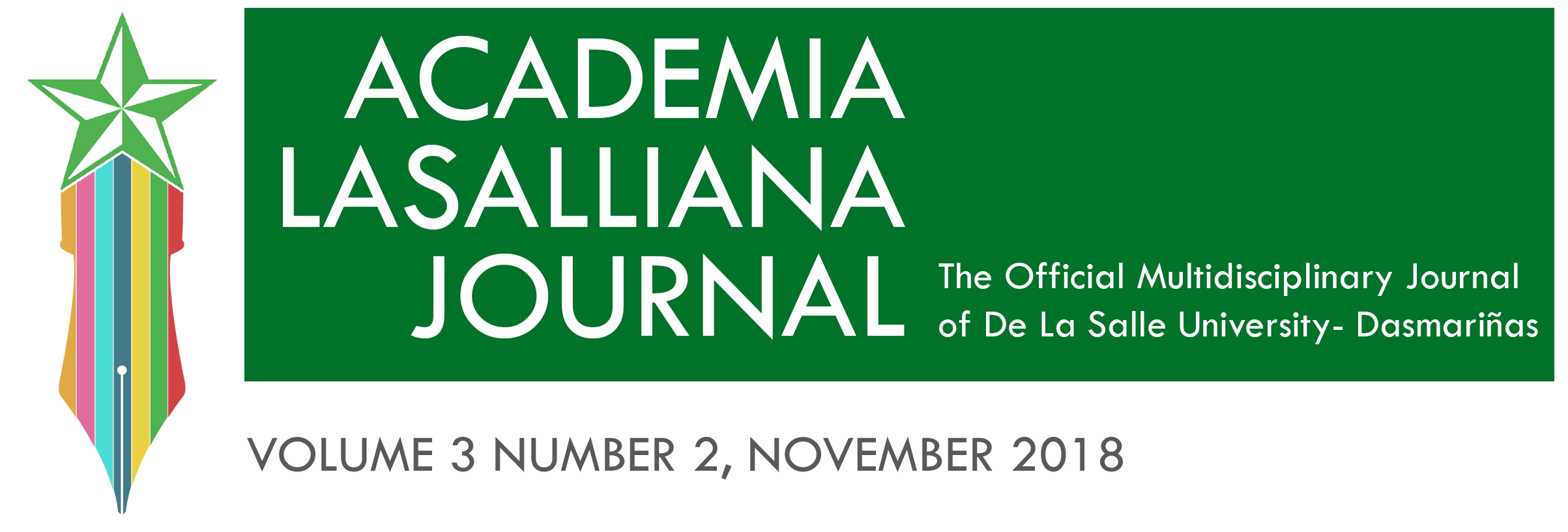
POVERTY TRENDS AND DETERMINANTS OF RELATIVE INCOME IN CALABARZON, PHILIPPINES
Willington O. Onuh
Allied Business Department, College of Business Administration and Accountancy
De La Salle University-Dasmariñas, City of Dasmariñas, Cavite, Philippines
ABSTRACT
Despite government efforts to reduce poverty in the Philippines, the latest poverty data released by the Philippine Statistics Authority (PSA) indicates that poverty incidence among Filipino population remain at 21.6%, which is against the UN Millennium Development Goal (MDG) to reduce extreme poverty in the Philippines to 17.2% in 2015. While substantial research has been done in the area of poverty, these research studies tend to focus on correlates of poverty using Ordinary Least Squares method. There has been no research using occupational sectors among other factors as correlates on different quantiles of relative income distribution. Utilizing 2009, 2012, and 2015 Family Income Expenditure Survey (FIES) data of PSA and employing quantile regression, this study estimates poverty trends and determinants of relative income in CALABARZON. The results show that household heads whose principal sector of employment are classified as Farmers, Forestry workers and Fishermen; and Laborers and unskilled workers consistently rank in the top two poorest in terms of poverty headcount, poverty gap and severity of poverty for the periods under study. In addition, factors such as family size, proportion of income spent on food, living in the rural area, and employment in agricultural/fishery/forestry and being laborer or unskilled worker negatively affect relative income. In the case of agricultural workers and unskilled workers, the quantile regression revealed that the negative impact on relative income was more pronounced on the 25th quantile (worse off) than the higher (better off) quantile. This implies that efforts to alleviate poverty may be more beneficial to households in the worse off poverty quantile.
Key words: poverty trends, headcount, poverty gap, severity, quantile regression
POLITICAL INCENTIVES AND LOCAL GOVERNMENT
SPENDING IN THE PHILIPPINES
Neil Steven Holmes
Social Sciences Department, College of Liberal Arts and Communication
De La Salle University-Dasmarinas, Dasmarinas City, Cavite, Philippines
ABSTRACT
The arena of public service delivery is political not only because it involves the allocation and distribution of limited resources but also because public service delivery is crucial to making or breaking one’s political career. As situated in the Philippine context wherein local and national elections are dominated by political families, this study used quantitative methodology to examine the relationship between the political incentives (i.e., electoral incentives) of Philippine local chief executives (governors and city mayors) and their expenditure patterns on public welfare services. The findings of the study nuanced the spending behavior of incumbent local chief executives running for re-election and of out-termer politicians who intend to field family relatives in office in order to secure their political family’s hold to power. The empirical tests show that out-termer politicians with chosen successors spend more on public welfare services compared to politicians who are still eligible for re-election. In sum, this study found that the electoral benefits that come with the provision of public welfare services motivate politicians to invest in these areas not only to fulfill their duties as public officials but also to fulfill their personal and political interests.
Key words: Political incentives, local government spending, provinces, cities
RELIGIOUS CONVERSION AS A FORM OF SOCIALIZATION:
A PHENOMENOLOGICAL UNDERSTANDING OF RELIGIOUS CONVERSION
Henry L. Bernardo
Religious Education Department, College of Education
De La Salle University-Dasmarinas, Dasmarinas City, Cavite 4115
ABSTRACT
The ongoing discussions on the nature of religious conversion and the increasing number of people who go from one religion to another demand a proper understanding of the essence of this experience. This phenomenological study tried to understand the lived experience of religious conversion by former Catholics who were born and raised as Catholics in the Philippines. An interpretative analysis of the data gathered through a semi-structured interview of the participants describes religious conversion as a process that involves four themes: dissatisfaction, satisfaction, crisis, and resolution. Moreover, two factors that serve as the leitmotif of the experience were identified namely, the effort of the old members to recruit converts and the active participation of the converts in the process. Because these two factors are equivalent to the brainwashing and drift models of conversion, it appears that these models are both operative in the process of religious conversion. This study also shows that these factors mirror the factors that make socialization possible, thus religious conversion is described as essentially a form of socialization. Finally, aside from its sociological and religious ramifications, this study provides helpful insights to pastors and church workers in their pastoral ministry.
Keywords: Religion, religious conversion, socialization, ex-Catholics, phenomenological study, pastoral ministry